See Global Voices special coverage page on the South Ossetia crisis.
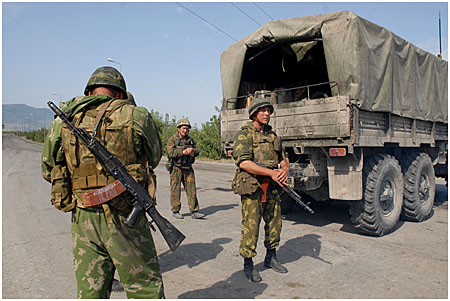
Russian Roadblock, Gori, Republic of Georgia © Onnik Krikorian 2008
When Russian forces rolled into the strategic Georgian town of Gori, information on the occupation was scarce. Journalists died during Russian bombing runs in the military campaign leading up Gori's capture, others were shot at, and access to the town was not only limited, but also perilous with South Ossetian, Chechen and Cossack militia hijacking cars and robbing occupants. However, some journalists did get through, and Radio Free Europe / Radio Liberty has posted a chronological series of dispatches from the town — Blogging from Gori.
The posts by the radio station's Goga Aptsiauri are a fascinating account of life under Russian occupation. In his final post made two days ago, Aptsiauri reports that the Russian military had finally left.
August 17-18
Overnight on August 17-18, there were at least several instances of marauding and looting. I met people at the regional administration building today who were coming to file complaints about such instances. They said agricultural machinery was stolen from a storage facility: six brand new tractors. Also, two night watchmen from a vegetable and foodstuff depot came to report that that someone had stolen vegetables and other supplies from there.
And then there are the two cars — one a Niva and the other a Lada […]. Wherever those occupants see a group of people gathered, they're stopping and robbing them of mobile phones and other personal belongings. There are no police forces, and Russian forces have apparently done nothing to stop these bandits. The cars’ occupants act very quickly — they hop out and take whatever they can take from people in two or three minutes, and then they disappear very quickly, in the direction of Tskhinvali.
[…]
August 18 — 1:45 p.m. local time (9:45 GMT)
Russia has promised a withdrawal, but we've seen troops today digging new trenches that could hint at a continued presence.
The checkpoints are still in place in the city as of right now. Last night, the Russians told me they would start withdrawing at 10 a.m. today, then they said noon. But now it's almost 2 p.m. and they're still here. In some places, Russian troops have even begun to dig new trenches. Almost an hour ago, at 1, I saw them carrying out what looked like a normal troop rotation of troops between checkpoints. Around Gori, there are quite a few checkpoints still in place, mainly at intersections and on bridges.
At the moment, the situation in the city is relatively calm. Humanitarian aid from the Georgian central government, international community, and the church is being distributed. Regional administration head Vladimer Vardzelashvili told me that there are seven distribution points around the city of Gori, and the residents are being informed of that fact. With other lines of communication shut down, one of the ways that authorities have tried to inform the public is by loudspeaker from cars.
[…]
August 18 — 2:45 p.m. local time (10:45 GMT)
There are no clear signs of any pullout, and a senior local official accuses Russian forces of reneging on a pledge to open a humanitarian corridor.
In fact, we've seen some movements by troops of the Russian Army contingent — they've been moving in trucks in the streets of Gori — but it is difficult to say what the aim of those movements is. And Russian troops are still manning the checkpoints, and they're still digging trenches.

Russian soldiers, Gori, Republic of Georgia © Onnik Krikorian 2008
August 18 — around 4 p.m. local time (noon GMT)
Some 15-20 minutes ago, a lot of armed people wearing masks entered Gori. They appeared to be from a Russian special forces unit. Their cars were at the front and back of a convoy that included two buses. All of a sudden, once the buses stopped, Russian reporters stepped out — at least some of them appeared to be from TV-Tsentr and TV-Zvezda. They approached representatives of the Georgian government — in particular, they started talking with State Minister for Regional Issues Davit Tkeshelashvili. Then it emerged that Russia's Ministry for Emergency Situations, together with the armed forces, had brought so-called humanitarian aid into Gori.
[…]
August 18 — 7 p.m. local time (3 p.m. GMT)
There are three hours to go until the so-called curfew, which was announced by Russian General Borisov, so people are going home. People have calmed down some since the initial chaos that accompanied the arrival of the international and Georgian aid shipments early today. I'm standing in the center of Gori, where people look like they're heading home with bags of aid supplies.
They drove this aid to a spot near a church, and opened the doors of the truck, offering it to people. Some Gori residents were confused initially, and began to take some of it. But soon they became aware that the goods weren't part of any aid distributed by the Georgian government, so many of them didn't take anything, saying they didn't need anything from a country that had bombed them and then sent in such humanitarian aid.
[…]
[…] Right now, there are no more international journalists in Gori, as far as I can tell. The town is being deserted because — due to Borisov's order command — at 10 p.m. the curfew goes into effect.
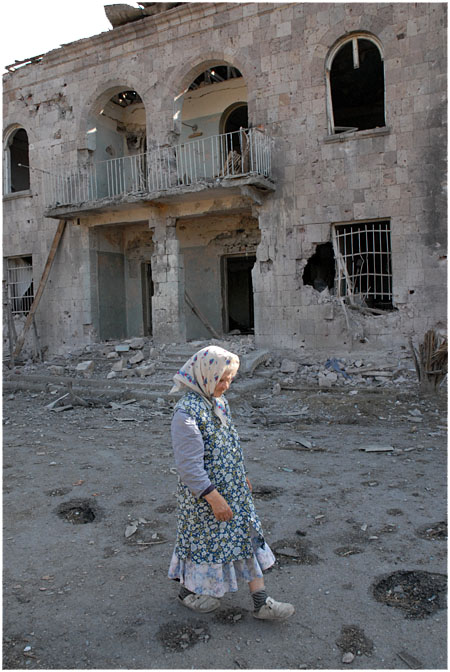
Gori, Republic of Georgia © Onnik Krikorian 2008
August 18 — 8:35 p.m. local time (4 p.m. GMT)
At the moment, we are standing near a checkpoint in a Gori neighborhood about 500 meters from the Stalin museum in the center of the city. The street has been sealed off by an armored vehicle and Russian forces are checking every single car that wants to pass. This checkpoint is located next to an abandoned Georgian tank unit, some 500 meters from Gori's center. I've seen many minivans with Russian license plates going in and out of the tank unit; no one knows what they're doing in there. I managed to stay here by chance, because of a curious incident that appears to be threatening residents in one part of the city. So with the curfew about 1 1/2 hours away, Russians are telling us we have to stay here and can't go home.
Approximately 15 minutes ago, local residents noticed a Russian soldier on a small street in the center of Gori. The soldier appears to be very drunk and quite disturbed, is armed with a loaded machine gun, and is saying he wants to go home. He is just running around the streets, armed with an automatic weapon. People tried to talk to him, but he wouldn't let anyone approach, and is threatening to open fire. Representatives of the government, including the Georgian presidential representative in the region, Lado Vardzelashvili, tried to establish contact with him. But the soldier aimed his weapon at them before moving toward a cul-de-sac.
[…] Local authorities notified Russian officers stationed at one of the checkpoints, and Russian officers and local government authorities were apparently trying to subdue the man. One of the Russian officers has summoned a two-man explosives unit, so I suppose the soldier could also possess a hand grenade or other explosives.
The incident is not the first time that seemingly drunken soldiers have roamed the town at night. But previously they've traveled in small groups, and have appeared more eager to loot vacant shops than disturb the residents.
August 18 — 10:15 p.m. local time (6:15 p.m. GMT)
Just a moment ago, Georgian National Security Council Secretary Aleksandre Lomaia also arrived. I spoke to him briefly, and he told me that the Russian army units have remained at all of their posts — what's more, it turns out that they have opened another post on the outskirts of Gori. There are no signs of the Russian forces leaving yet, Lomaia said, calling that a gross violation of the EU-brokered agreement.
[…]
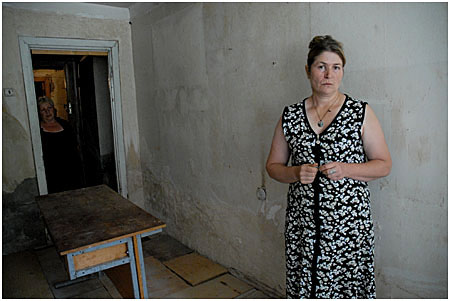
IDP from Gori, Tbilisi, Republic of Georgia © Onnik Krikorian 2008
August 18 — 11:30 p.m. local time (7:30 p.m. GMT)
I'm writing this on the balcony of my apartment. The town has electricity, but when I look outside, only a few windows are lit; residents are still afraid to leave lights on at night. There are no Georgian channels on television — the channel that used to host Rustavi 2 now runs the Russian channel, Rossia. I guess the signal is coming from the South Ossetian capital, Tskhinvali. So right now, Rossia is the only TV channel that Gori residents can watch. Ideological warfare, I guess.
[…]
But also, some of the residents who had fled Gori appear to be returning in greater numbers in the last couple of days. A local administration official has told me that there are about 15,000 residents here at the moment — up from the 5,000 of just three or four days ago — although those are rough estimates. I've seen people today who had fled to surrounding villages walking back into Gori.
I've witnessed Russian soldiers approaching local residents and asking them if they could spare fruit or any other food. It seems to me that the appearance and demeanor of those troops is less menacing or aggressive than in previous days. I've seen locals — a number of times and on their own initiative — offering food, cigarettes, or some of Gori's famous apples to Russian troops.
[…]
August 19 — around noon local time (8 a.m. GMT)
A short while ago, while I was visiting Gori's local administration building, I witnessed Russian soldiers entering the building and causing quite a commotion. I had a chance to talk to one of those soldiers — he had an automatic weapon in front of him — and he told me that they were here to accompany humanitarian aid. There's no humanitarian aid stored in that building, of course.
August 19 — 1 p.m. local time (9 a.m. GMT)
[…]
Several of Gori's shops have opened, although prices are quite high in some of them. The town's market has not started to function yet. Bread is being baked; there are water and electricity supplies. Natural gas remains cut off because, as far as we are aware, the main pipeline is located near the apartment blocks at the entrance of Gori that were bombed and it is still dangerous to pipe gas through that line — so the Georgian authorities have decided to keep it off for now.
One cable television station has started to operate again, and a limited number of people receive Georgian Rustavi-2 and Ajara TV. But on the whole, most of Gori's residents are still largely relegated to watching Russian state channel Rossia.
August 19 — 3:30 p.m. local time (11:30 a.m. GMT)
I've visited some of the shops that finally reopened. In the center, the prices are not much higher than before the war broke out. But in the outlying parts of town, a friend says prices are high of goods like cigarettes.
[…]
The residents have been sharing stories of looting incidents. Everyone recalled the looting of the TBC bank office a few days ago.
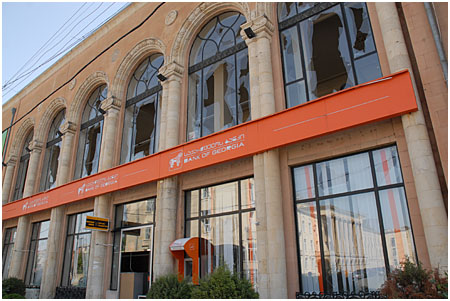
Looted Bank, Gori, Republic of Georgia © Onnik Krkorian 2008
August 19 — 5 p.m. local time (1 p.m. GMT)
[…]
[…] I just saw a Reuters report of signs of a Russian pullout, but what I'm seeing is that all checkpoints are still in place on the main intersection. And, moreover, no new journalists have been in since those reporters escorted by Russian special forces came and left — which seems to me an indicator that the checkpoint at the entrance to the city is still in place. So I'm pretty certain that all routes into town are still blocked.
August 19 — 6:30 p.m. local time (2:30 p.m. GMT)
An hour or so ago, in the center of town, there was the movement of those two armored vehicles I mentioned in my last entry. And of course a Reuters report suggesting a movement might be imminent.
[…]
There was another instance of local residents being robbed by a car — with Russian plates — that hadn't been seen before: a Lada. Two people inside that car were armed, and they stopped to rob several groups of residents in different parts of the city. Local officials were informed by a citizen, and the local representatives went to complain to the Russian officers. The Russian officers came to the local administration building and promised Governor Vardzelashvili that they'd do everything they could to prevent such incidents. (One local official told me that one of the perpetrators was a Russian Army enlisted man of Chechen origin with an automatic weapon, but that's something I most certainly can't confirm.
August 19 — 9 p.m. local time (5 p.m. GMT)
[…]
I also spoke today with Giorgi Baramidze, the state minister for Euro-Atlantic integration, who kept stressing that right now, we should believe what we see with our own eyes. The Russian Army moves from place to place, but this should not fool anyone. A pullout cannot go unnoticed, he said, but for now the Russians are not even considering it.
Baramidze also talked about the terrible things that have been going on, as he put it, “because of the Russian occupation” — killings, rapes, kidnapping, looting. He said all of this is still continuing. He also mentioned the group of civilians, some of them women, who have been captured by the other side, and are being kept in awful conditions, forced to work like slaves. It is heartbreaking to listen to such things.
[…]
August 19 — midnight local time (8 p.m. GMT)
Some explosions rang out about two hours ago. I spoke with regional Governor Vladimer Vardzelashvili, and he told me that Russian forces were blowing up the base of a Georgian artillery brigade near the Gori exit on the highway. We also know that they're blowing up a military base at Osiauri. None of that should be mistaken for bombardment, though; the Russians are just destroying military infrastructure. Those facilities are located pretty far from populated areas, so the explosions shouldn’t pose any threat to civilians.
[…]
At the moment, the streets of Gori are virtually empty. I'm at home watching television. Apart from Rossia, it’s now possible to receive another Russian television channel, ORT TV. But, as I said in another post, a transmitter has been brought in that lets us finally watch Georgian television — Rustavi-2. It’s is a nice change from yesterday.
August 20 — 9 a.m. local time (5 a.m. GMT)
I have good news to report. Almost all night in Gori, you could hear the movement of heavy machinery. Just about five minutes ago, when I spoke with Gori regional Governor Vladimer Vardzelashvili, he confirmed that Russian armored vehicles and tanks are leaving the town — although it's too early to say that they're pulling out completely.
[…]
Unfortunately that TV transmitter isn't strong enough to reach surrounding villages, but the broadcasts are accessible in most of Gori itself. But now, since the routes to those villages are no longer blocked — as they were in recent days — information is reaching those villagers. People are getting the word out.
August 20 — 1:30 p.m. local time (9:30 a.m. GMT)
[…]
Governor Vardzelashvili says there are four grocery stores open in Gori, and four bakeries operating. Banks aren't open yet, so people have no access to bank accounts.
Some humanitarian problems have also reappeared, with some villages still cut off.
In one village on the way to Tskhinvali, called Tirdznisi, Russians were not only blocking aid deliveries but also checking IDs. Anyone without papers was taken to the military command post — they're said to have detained a U.S. national. In response to that roundup, Governor Vardzelashvili contacted Major General Borisov and asked that those people be released.
More recently, the governor says Russian troops entered the village of Samtavisi, which is several kilometers from Igoeti, and started ordering people to evacuate the village. There was reportedly some panic, and Vardzelashvili has informed those UN visitors of that incident.
The general mood in Gori is that people seem more optimistic than yesterday, with the number of troops and vehicles decreasing.
[…]
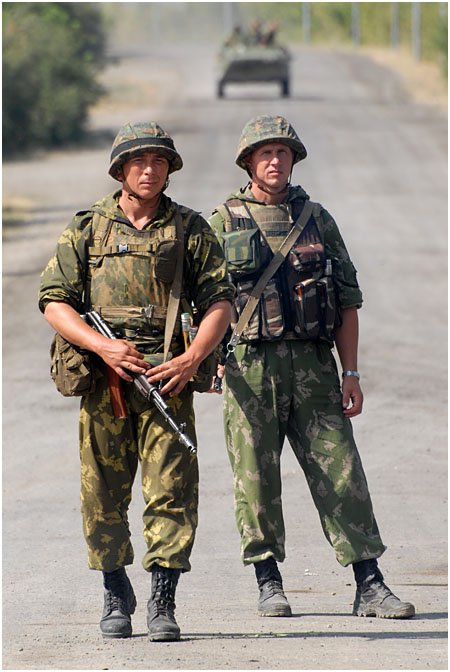
Russian Roadblock, Gori, Republic of Georgia © Onnik Krikorian 2008
August 20 — 5 p.m. local time (1 p.m. GMT)
A number of rapid developments. First, Russians prevented Georgian National Security Council Secretary Aleksandre Lomaia and international journalists from entering the village of Karaleti — no one knows why. They allowed humanitarian aid to go in, but Lomaia and the journalists were asked to turn around and go back.
One of the most important events was a visit by a Council of Europe delegation headed by PACE Monitoring Committee co-rapporteur Matyas Eorsi. The delegation met with Gori Governor Vardzelashvili, who told them about the situation in Gori. He told them everything — stories of how Russian soldiers walk around drunk, how they disturb people, knocking on doors and asking for alcohol.
[…]
August 20 — 9:30 p.m. local time (5:30 p.m. GMT)
The Russian Army checkpoints that were set up inside Gori are gone. They have retained their checkpoints at all entrances and exits of the town– as well as on the central highway — but the center of the town is now free of them.
[…]
The administration has set up a hotline for people to call in case of trouble. Swift action is promised — but in the absence of police, it's going to be members of the administration and us journalists who will actually take that action. Unarmed people will confront armed groups — if they indeed come to loot, that is.
The streets are virtually empty, people are staying in their homes. They have become used to the curfew, and even though it is really unclear whether technically it is still in force, they still go home at 8 p.m.
Oh, wait. I have breaking news: Just as I was about to finish this entry, someone called me and said the Russians were back inside Gori, and had restored their checkpoint at the bridge over the Mtkvari River. This seemed hard to believe, but then I heard the unmistakable sound of their armored vehicles rolling in. As you can see, things keep changing every hour in Gori. I'll find out as much as I can for my next entry.
August 20 — 11:30 p.m. local time (7:30 p.m. GMT)
It's true, the Russians are back.
The checkpoint at the Mtkvari bridge has been restored, and some 40 soldiers are stationed there; the one at the Liakhvi River is also back, with its two armored vehicles. A third, toward the Gori-Tbilisi highway, is also back up, and houses 40 servicemen. Russian soldiers keep driving up and down the streets of Gori in their Willy-type jeeps.
[…]
It's possible that such a scenario was being planned — the Russian side has been busily referring to some kind of “provocation” that Georgians are allegedly planning. So the situation is pretty unpredictable.
[…]
August 21 — around noon local time (8 a.m. GMT)
Firstly, I'd like to debunk Russian news agency reports this morning that 40 pieces of hardware (armored vehicles, etc.) had left Gori. Around 10 minutes ago, I spoke to regional Governor Vardzelashvili, who says there have been no changes since last night. Reestablished checkpoints are still up, and troops are still in Gori.
[…]
August 21 — around 12:30 p.m. local time (8:30 a.m. GMT)
Major General Borisov is back.
He just turned up at Gori's main square. He says he's “back to restore order” in Gori. “My bosses told me, ‘Go back, because everything is paralyzed.’ “
Then he leaves in the direction of the village of Khashuri, where Russian troops have apparently detained French Ambassador Alain Fournier. Governor Vardzelashvili says the ambassador was detained on his way back after accompanying an aid shipment to Sachkhere, in western Georgia. […]
[…]
August 21 — around 2:30 p.m. local time (10:30 a.m. GMT)
After I'd posed a few questions to Russian Major General Borisov about topics that included the detention of the French ambassador, he stopped me in mid-sentence: “I'm supposed to go release him, and you're keeping me here with your questions.” With that, I let him go, of course. He went in the direction of Khashuri, and Ambassador Alain Fournier was released soon afterward. The ambassador went directly to Tbilisi without stopping in Gori.
August 21 — 5 p.m. local time (1 p.m. GMT)
[…]
About five minutes ago, I spoke with Major General Borisov and he was quite candid. (He smelled of alcohol, which I suspect had something to do with his candor.) “Russia is a superpower that will not allow anyone to intimidate it,” he told me, and added, “Let the Americans try to arm you again, and we'll see what happens to them.”
An OSCE delegation headed by Terhi Hakkala visited Gori today. I spoke to her, and she was quite shocked by what she saw in the region; and she was very upset that the cease-fire agreement is not being fulfilled. She expressed concern at seeing Russian troops still in Gori and told me that Borisov promised her that Russian troops will leave tomorrow.
[…]
August 21 — 10:15 p.m. local time (6:15 p.m. GMT)
[…]
I saw something very important today — photos of military bases that used to station Georgian forces prior to this war. The artillery brigade base, for instance. Someone with an excellent camera and impressive zooming capabilities managed to photograph what these places look like now. There are explosives everywhere – even wrapped around the walls. The buildings are mined, and it is perfectly possible to imagine that once the Russians have left, these bases will be blown up.
[…]
Today, I saw several children on the streets of Gori for the first time in a long time. They had obviously recently returned to the city. Some were playing, others were riding bicycles. It felt very nice to watch them play, to hear their cheerful voices.
I really miss my own kids. I hope it will be possible to bring them back home to Gori soon.
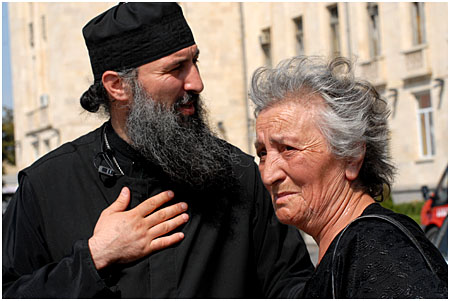
Gori, Republic of Georgia © Onnik Krikorian 2008
August 22 — 09:15 a.m. local time (5:15 a.m. GMT)
Nothing has changed. None of the checkpoints in the center of town have been dismantled, although I heard from contacts in the surrounding villages that checkpoints there were gradually being abandoned. All of the entrances to Gori remain blocked. […]
[…]
August 22 — 1:20 p.m. (9:20 a.m. GMT)
[…]
Doctors from the hospital are bringing the Georgian returnees something to eat and drink. Many of these people have bloodstains on their clothes and cuts and bruises on their faces. But all of them, except for one, insisted they had not been beaten — they said they got injured before they were detained, that they fell down or something like that. It's obvious they're very frightened, and just one of them told me that he was in fact beaten with the butt of a machine gun and with wooden clubs. One of the men was in such a state of shock that he didn't realize he had been brought to Gori; he thought he was still in Tskhinvali. The doctors later said he had a concussion.
[…]
August 22 — 3:30 p.m. local time (11:30 a.m. GMT)
At this moment, I can tell you that not a single Russian soldier or piece of military hardware remains in the town of Gori. Some two hours ago, they started their withdrawal from checkpoints that were set up on nearby mountains. Then, around half an hour ago, the last checkpoint was removed in Gori, too.
August 22 — 4 p.m. local time (noon GMT)
[…]
[…] One old man tells me that last night alone, three different groups of looters raided his village. He says the first group took personal property, furniture, and cattle. The second group stormed in and expelled people from their homes — kicking and beating some of them, telling them never to return. The third group lit their homes on fire. This elderly man says he watched with his own eyes as his house was set ablaze. The villagers fled through forests and fields, and finally reached the village of Ditsi, where the truck driver let them board before bringing them here.
They all look utterly devastated and helpless. It's not easy to see the pain on their faces as they relate their stories. After a short time in Gori, they were put on a bus bound for Tbilisi, where, I presume, they'll be housed in makeshift shelters.
August 22 — 7:30 p.m. local time (3:30 GMT)
Georgian police have arrived in Gori. At last!
Five police cars have entered the town. Everyone's been waiting for this moment all day today. This is really good news.
Gori's return to normalcy is truly palpable. Cars are moving, public transportation is working, people are walking on the streets. Right now I'm watching a priest talk to a group of people on Gori's central square.
Everyone's talking about the latest developments — including how relieved they are that the Russians have left. People have been preparing to greet the Georgian police, once they arrive.
[…]
August 22 — 11 p.m. local time (7 p.m. GMT)
This is the first night since this crisis broke out that Gori's streets are full of life. Some people are hanging Georgian flags from their balconies to celebrate the Russian forces’ withdrawal — and the return of Georgian police.
[…]
National Security Council Secretary Alexandre Lomaia also spoke to the press about today's developments. He says calm and order will be restored swiftly in Gori and its surrounding areas. He also says an agreement was reached with Russian forces so they would not interfere in the work of Georgian police.
[…]
Lomaia says talks on bringing international peacekeepers to these areas will take place very soon.
[…]
So that's where we stand. The Russian forces have left Gori. The town is now full of journalists — both Georgian and international. I guess there's no more need for this kind of reporting, this blog to chronicle our town under siege.
Hopefully this weekend will see a final phase of normalization. Gori is full of people again, and my kids will be coming back to town, too. So I look forward to a return to family life — and normal journalistic work.
The full chronological account of Gori under Russian occupation is here.







3 comments